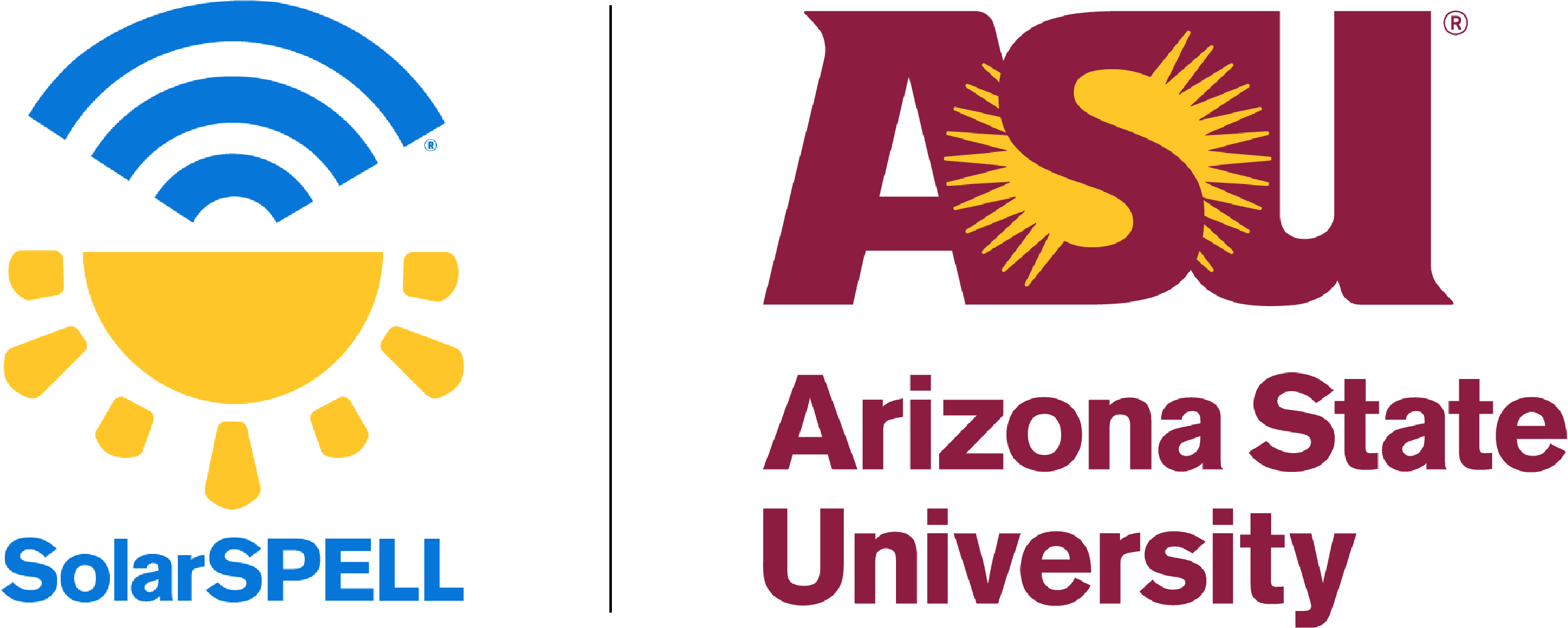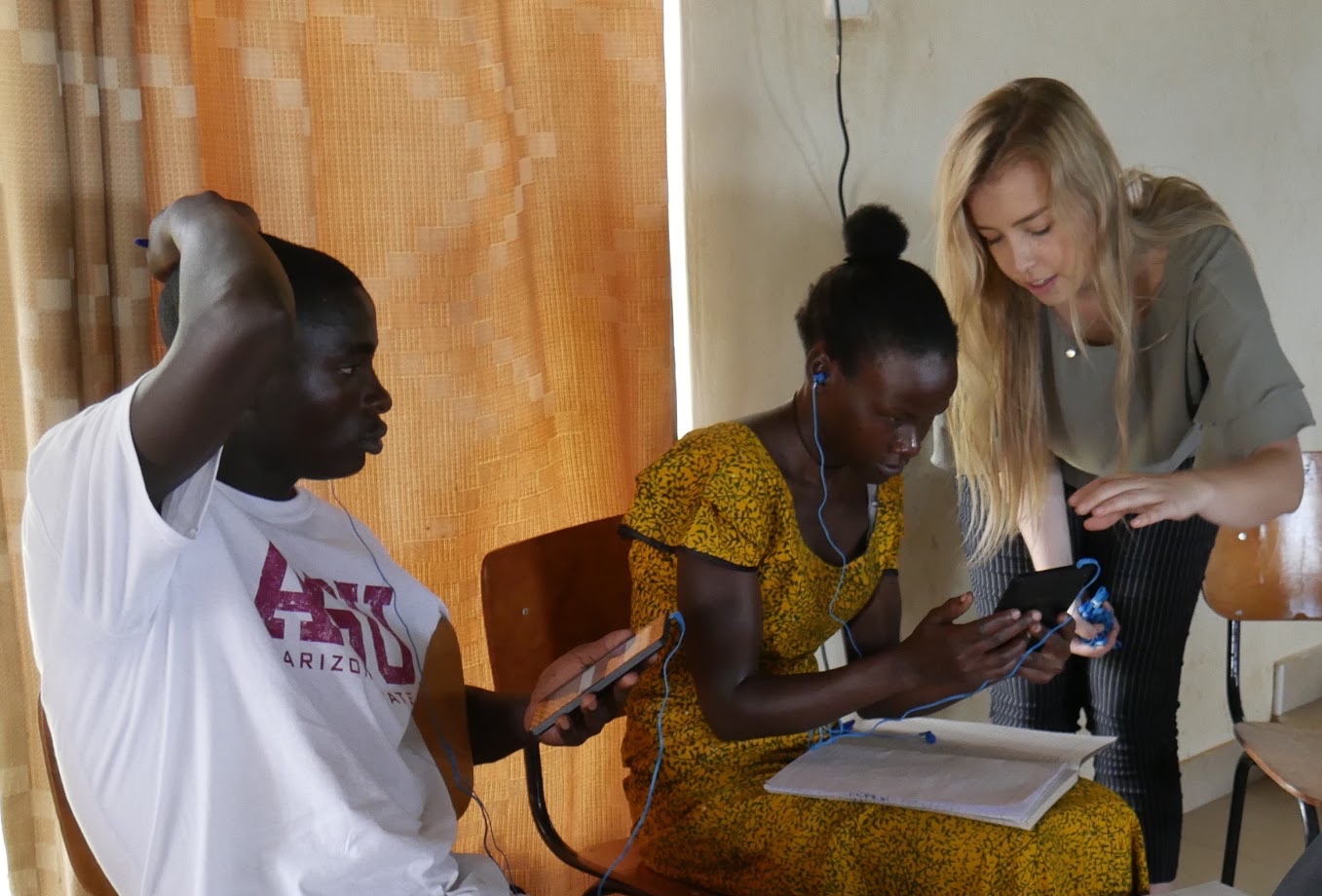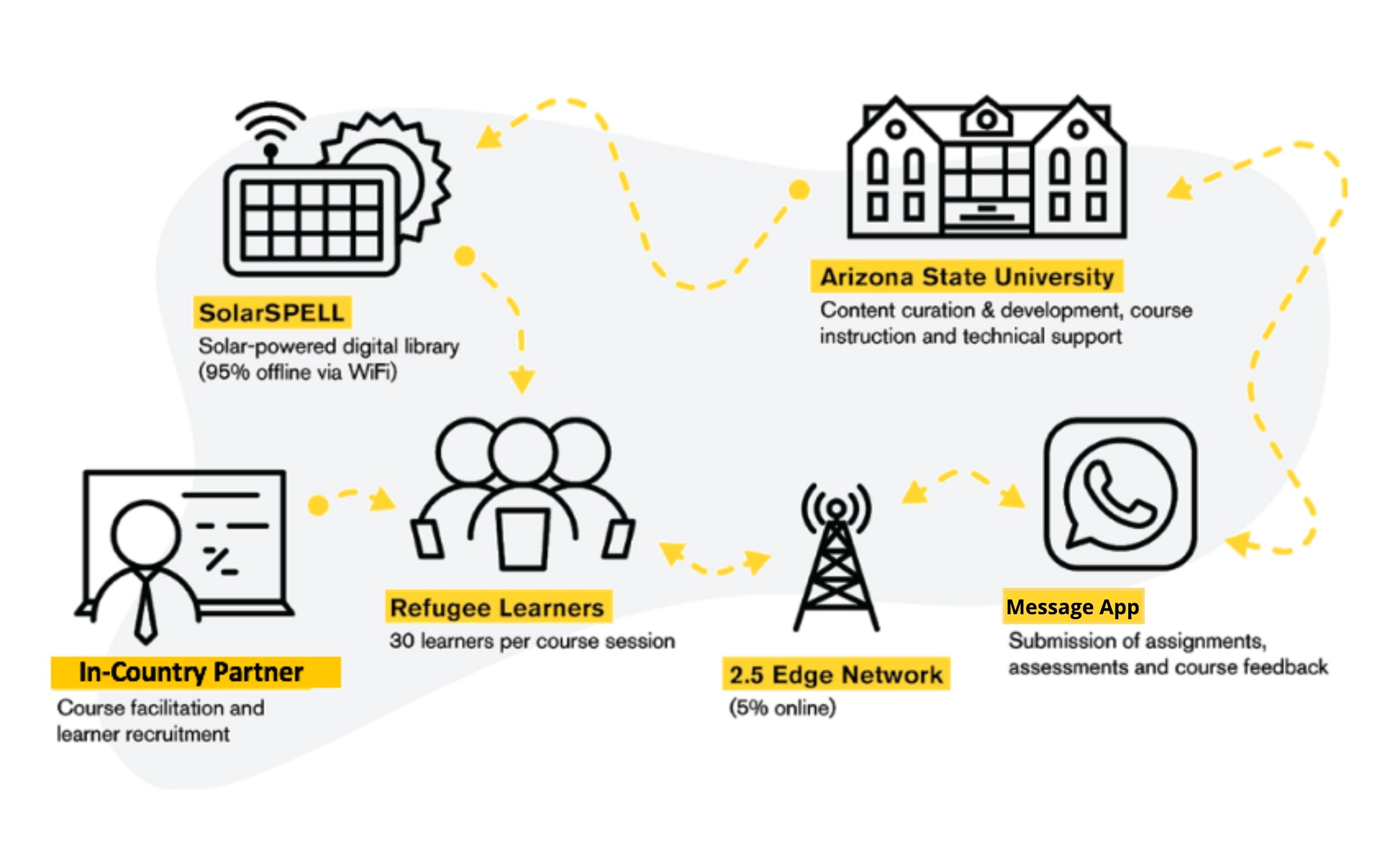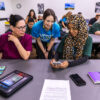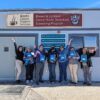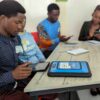At the end of April, SolarSPELL’s Sustainable Implementation Lead, Chloe Scott, traveled to Uganda to help with launching the Education for Humanity: Powered by SolarSPELL pilot agribusiness course.
ASU Education for Humanity: Powered by SolarSPELL provides access to a university-level course to locations with low-bandwidth, and is offered in a 95%-offline-5%-online format. The 95% offline content (all of the course content, including videos, pdf files, and a learning management system) is hosted on the offline SolarSPELL digital library, while the 5% of the course that needs to be online (to communicate assignments, tests, etc., back-and-forth to ASU for assessment) uses a communication application, over the local mobile network. A diagram illustrating this concept is below.
The SolarSPELL digital library emits an offline WiFi hotspot that mimics an online experience. Learners access the course content by connecting their own device (smartphone, tablet, or laptop) to the SolarSPELL’s offline WiFi signal. Course content is downloadable, so it can be studied and reviewed even when students are not connected to the SolarSPELL. To see how the SolarSPELL works, please visit this link.
The SolarSPELL initiative creates access to quality educational information for motivated learners in resource-constrained communities that have limited electricity and internet capabilities. Leveraging SolarSPELL’s base technology, as well as its existing East Africa library, Education for Humanity designed an Agribusiness course to bring to Nakivale Refugee settlement in Uganda, augmented SolarSPELL’s East Africa library with supplementary agriculture-related materials, and created an offline course, using the Moodle open access learning management system. Both the course and the East Africa library were available to learners taking the agribusiness course, designed so that the students could access the library to research additional information to supplement what they learned within the course, or research topics further. The SolarSPELL team provided insight and support throughout the process, as well as in-field support for training and launching the pilot.
To implement this pilot course, Education for Humanity partnered with Windle International Uganda, whose mission is to equip refugees, and those affected by conflict in Africa, to address the challenges of development. They provide access to education, training, and employment opportunities through advocacy and direct programme activity. Windle International Uganda is a leading provider of access to university education, post-primary education, and vocational training for conflict-affected Africans since 1996. Windle has provided invaluable local insight to ensure the Agribusiness course content is relevant to and desired by the local community. Based on this insight, the creation of the Agribusiness course was led by Dr. Jeffery Englin and the Education for Humanity team, with the support of ASU libraries.
The pilot is taking place in Nakivale Refugee settlement in the southwest region of Uganda. Windle selected 2 course facilitators (1 female and 1 male) and 30 refugee learners (10 female and 20 male) with a variety of nationalities (Burundian, Congolese, Rwandan, South Sudanese, Sudanese, Somalian and Ugandan). During the implementation trip, the team conducted a three-day facilitator training workshop, a learner orientation and training, a digital library training, a primary school site visit, and launched the program. The highlights from this implementation are outlined below:
Course Facilitator Training
The three-day course facilitator training was lead by Carrie Bauer, Education for Humanity’s Instructional Designer, and Chloe Scott, SolarSPELL’s Sustainable Implementation Lead.
This training covered the following: course navigation, hardware/technology training, facilitator duties, facilitator best practices, impact evaluation, a communications plan, digital library training, and action-planning. Throughout the three days, the facilitators continuously impressed the trainers with their digital literacy and technology skills. They quickly grasped the concepts covered in the training, demonstrated critical thinking about their role, and anticipated challenges for the group to troubleshoot.
E4H: Powered by SolarSPELL Pilot Program Launch
The two-hour program launch featured speeches from Windle International Uganda, the Principal of a local Vocational Training Center, a student representative from the course, Arizona State University representatives, the UNHCR, and a local representative from the Office of the Prime Minister (OPM). They expressed gratitude to those involved in the project and encouragement to the learners. They shared that this course would not only build the capacity of the learners, but also that the learners would influence their greater community by sharing the knowledge they acquire. This event introduced the SolarSPELL technology, the agribusiness course, and the program’s objectives to important stakeholders working in education in the Nakivale Refugee Settlement.
The Digital Library Training
A SolarSPELL digital library training, led by Chloe, was provided to 24 learners and 2 facilitators. The training covered 1) accessing the digital library, 2) content overview/training, and 3) downloading content. When the students were given free time, they explored the local folders (Uganda and others), Wikipedia, additional training videos, the agricultural folder, and storybooks. Those with their own devices downloaded content for themselves and their younger siblings. Throughout the day, the learners continued to play SolarSPELL training videos, as well as navigate through the SolarSPELL digital library. This demonstrated learners’ enthusiasm in having access to additional information, beyond the materials required for the course.
Digital Library for Primary Schools – Site Survey
The Education Project Officer for Windle took the ASU team to a primary school in Nakivale to conduct a site survey. Windle, in partnership with the government and UNHCR, runs 11 primary schools and one secondary school. The average teacher-to-student ratio of these schools is 1:200. Learners are admitted at all times throughout the year; however, teachers and available resources do not increase. The primary school that the team visited had about 2,200 learners and 14 staff members (including administrators, teachers, and teaching assistants). The team met with the Head Teacher and provided a demonstration of the SolarSPELL digital library. The Head Teacher and two Windle staff noted the potential impact SolarSPELL could have in schools in the area. They believe it would increase the resources available to teachers and students immensely, empower the development of crucial digital skills, and even increase attendance based on student interest in using the technology.
“It was tremendously exciting to be involved in the launch of the Education for Humanity: Powered by SolarSPELL pilot program in the Nakivale Refugee Settlement. I had the opportunity to collaborate with staff of various NGOs doing incredible work to meet the needs of the Nakivale community. It was an incredible experience to work alongside the facilitators during the first week of the course to support the learners and to troubleshoot any technology challenges that arose. Each learner that I had the pleasure of meeting was so talented and driven. I cannot wait to see all that they accomplish during the pilot and in their future careers. I look forward to continuing to develop SolarSPELL’s partnership with Windle in order to serve the primary schools in the Nakivale community. The collaboration between ASU’s Education for Humanity and SolarSPELL is exciting. We have the potential to bring higher education and other learning opportunities to refugees in resource-constrained locations around the world.”
– Chloe Scott, SolarSPELL’s Sustainable Implementation Lead
